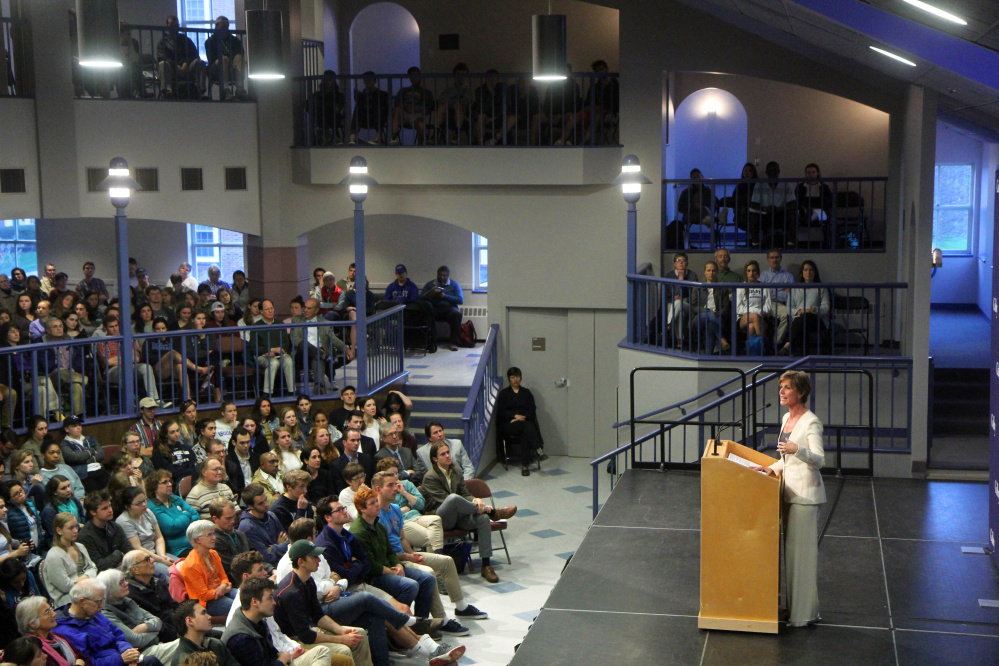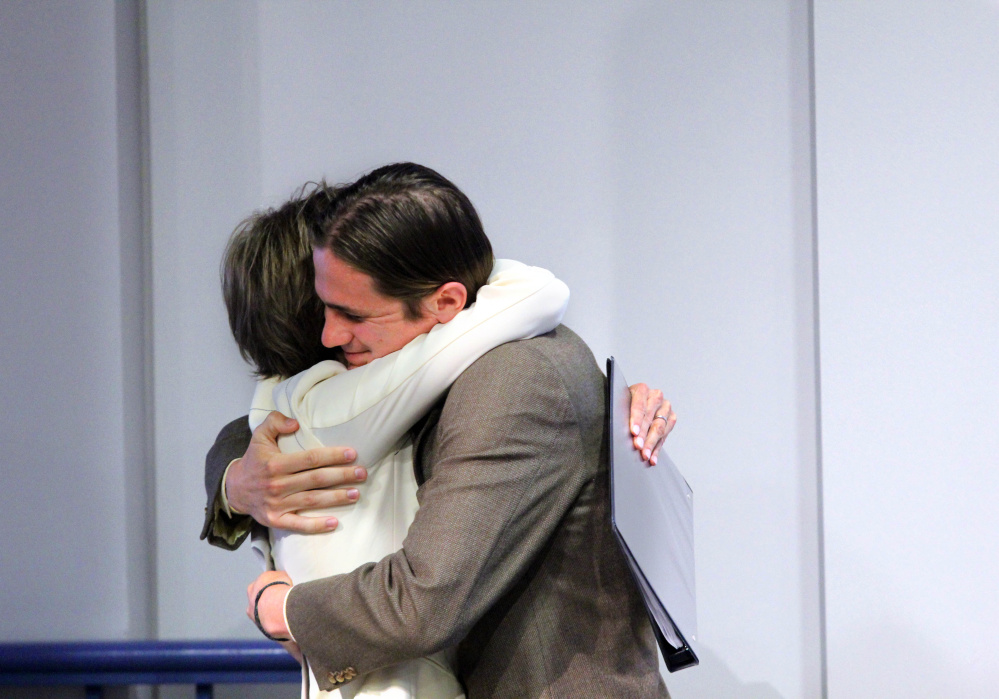WATERVILLE — Before a packed house Wednesday night in Colby College’s Page Commons, former Acting U.S. Attorney General Sally Yates outlined what she thinks still needs to be done in terms of criminal justice reform.
Yates, who served for more than 27 years in the Justice Department, spoke to Colby students, faculty members and the public about how broad an issue criminal justice reform is. She spent her roughly 30-minute speech addressing two particular reform issues: incarceration, and reforming the prison systems, including what tools they’re given to prepare inmates to re-enter their communities.
Yates, who was introduced by her son Quill, a Colby student, said while the United States has just 5 percent of the world’s population, it has 25 percent of the world’s prisoners. She said in the 1980s, federal and state policies that were put in place resulted in massive overincarceration. These policies largely revolved around drug offenses, when trends such as mandatory minimum sentencing, which are sentences that legally have to be a certain length based on the quantity of drugs a person had, and a “three strike” policy, wherein someone convicted on a third charge goes to prison for life.
“This resulted in an explosion in the prison population,” she said.
She said this came at a great cost to the prison systems through overpopulation, but also to the communities the prisoners were coming from. The sentencing laws, she said, resulted in a less safe environment, not a safer one. She said it has reached the point that prison and detention costs now make up one-third of the Department of Justice’s budget, which means there is less funding for other programs under the department’s jurisdiction.
She said nowhere is this more evident than in the lack of resources for rehabilitation programs in prisons. As prison populations started to increase rapidly, resources formerly used for education and other programs was diverted toward more staffing in the prisons.
“We need to make sure inmates have tools to be successful when they are released from prison,” she said.
Yates said while President Barack Obama, whom she served as deputy attorney general, understood those things and worked hard to make progress in reforms and reduce the federal prison population by 30,000, the current presidential administration seems interested solely in enforcement. Equipping those in prison with the tools to succeed once they are released is vital, Yates said, since invariably most will be released.
As for how to do that, Yates challenged the crowd to make their voices heard on a local level.
“Change happens in our country when our citizens demand it, when people stand up and say this is who we are and this is what we stand for,” she said.
After her speech, Yates said criminal justice reform is something she strongly believes in, but that it has to be a grass-roots effort. She said she’s spoken to audiences around the country to educate people on the issues and to have them make their voices heard.
While it did not come up during her speech or a question-and-answer session with the crowd, Yates, 56, made headlines earlier this year when she warned that President Donald Trump’s former National Security Advisor Michael Flynn had not told the truth about his contacts with Russia concerning sanctions, saying he had become vulnerable to blackmail by the Russians. Her warning was published in The Washington Post on Feb. 13, and within hours Flynn resigned.
She also made headlines when, on Jan. 30, she ordered the Justice Department not to defend Trump’s executive order on immigration and travel, which temporarily would have banned immigrants from certain predominantly Muslim-based countries from entering the country. Yates wrote a letter to the Department of Justice in which she said she was “not convinced that the defense of the executive order is consistent with these responsibilities of the Department of Justice staff, nor am I convinced that the executive order is lawful.”
She continued in her letter: “I am responsible for ensuring that the positions we take in court remain consistent with this institution’s solemn obligation to always seek justice and stand for what is right.” She wrote that for as long as she was the acting attorney general, the Department of Justice will not present arguments in defense of the executive order, “unless and until I become convinced that it is appropriate to do so.”
Later that day, she was delivered a letter saying she was dismissed from the administration.
A White House statement said Yates had “betrayed the Department of Justice by refusing to enforce a legal order designed to protect the citizens of the United States. This order was approved as to form and legality by the Department of Justice Office of Legal Counsel.”
She was the acting attorney general from Jan. 20 until Jan. 30.
Yates, a Democrat, is expected to testify Monday before a U.S. Senate Committee on Russia regarding possible Russian interference in last year’s presidential election. In March, she was invited to testify before the House of Representatives Intelligence Committee, also about possible Russian involvement in the 2016 election. However, that meeting was postponed abruptly by Chairman Devin Nunes in a maneuver with the White House. Nunes eventually stepped away from the investigation into Russia and became the subject of a House ethics probe himself. The Washington Post reported that the White House had attempted to block Yates from testifying, though White House press secretary Sean Spicer said Trump did not have a problem with her testifying. CNN reported Nunes, R-Calif., said he wanted to hear first from FBI Director James Comey and National Security Agency Director Mike Rogers in a classified setting.
According to an article from CNN published the day before she spoke at Colby, Yates was prepared to testify she gave a forceful warning to the White House regarding Flynn nearly three weeks before he was fired. This testimony would contradict the administration’s version of the events, according to CNN.
The CNN report states that on Jan. 26, Yates told White House Counsel Don McGahn that Flynn was lying when he denied in public and in private that he had discussed U.S. sanctions on Russia in conversations with Russian Ambassador to the United States Sergei Kislyak. Trump later fired Flynn after reports that the he had misled Vice President Mike Pence and other White House officials about his conversations with Kislyak. Flynn was fired 18 days after Yates met McGahn over reports Flynn had misled Pence and other staff about his conversations with Kislyak.
Yates was nominated by President Barack Obama to be U.S. Attorney in the Northern District of Georgia, and was confirmed in 2010. She was the first woman to hold that position in that district. In 2015, the Senate confirmed Yates as the U.S. deputy attorney general, and she served under Attorney General Loretta Lynch. Yates was offered the role as acting attorney general by the Trump administration in January until the Senate confirmed a successor for Lynch.
Yates declined to comment on the upcoming testimony. No member of the audience asked her about that, and Yates attributed that absence of questions to the engaging nature of the topic of her speech.
“I’m glad they were invested,” she said.
Colin Ellis — 861-9253
cellis@centralmaine.com
Twitter: @colinoellis
Send questions/comments to the editors.






Success. Please wait for the page to reload. If the page does not reload within 5 seconds, please refresh the page.
Enter your email and password to access comments.
Hi, to comment on stories you must . This profile is in addition to your subscription and website login.
Already have a commenting profile? .
Invalid username/password.
Please check your email to confirm and complete your registration.
Only subscribers are eligible to post comments. Please subscribe or login first for digital access. Here’s why.
Use the form below to reset your password. When you've submitted your account email, we will send an email with a reset code.